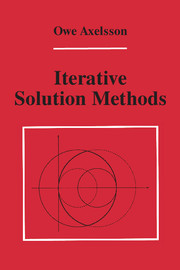Book contents
- Frontmatter
- Contents
- Preface
- Acknowledgments
- 1 Direct Solution Methods
- 2 Theory of Matrix Eigenvalues
- 3 Positive Definite Matrices, Schur Complements, and Generalized Eigenvalue Problems
- 4 Reducible and Irreducible Matrices and the Perron-Frobenius Theory for Nonnegative Matrices
- 5 Basic Iterative Methods and Their Rates of Convergence
- 6 M-Matrices, Convergent Splittings, and the SOR Method
- 7 Incomplete Factorization Preconditioning Methods
- 8 Approximate Matrix Inverses and Corresponding Preconditioning Methods
- 9 Block Diagonal and Schur Complement Preconditionings
- 10 Estimates of Eigenvalues and Condition Numbers for Preconditioned Matrices
- 11 Conjugate Gradient and Lanczos-Type Methods
- 12 Generalized Conjugate Gradient Methods
- 13 The Rate of Convergence of the Conjugate Gradient Method
- Appendices
- Index
3 - Positive Definite Matrices, Schur Complements, and Generalized Eigenvalue Problems
Published online by Cambridge University Press: 05 August 2012
- Frontmatter
- Contents
- Preface
- Acknowledgments
- 1 Direct Solution Methods
- 2 Theory of Matrix Eigenvalues
- 3 Positive Definite Matrices, Schur Complements, and Generalized Eigenvalue Problems
- 4 Reducible and Irreducible Matrices and the Perron-Frobenius Theory for Nonnegative Matrices
- 5 Basic Iterative Methods and Their Rates of Convergence
- 6 M-Matrices, Convergent Splittings, and the SOR Method
- 7 Incomplete Factorization Preconditioning Methods
- 8 Approximate Matrix Inverses and Corresponding Preconditioning Methods
- 9 Block Diagonal and Schur Complement Preconditionings
- 10 Estimates of Eigenvalues and Condition Numbers for Preconditioned Matrices
- 11 Conjugate Gradient and Lanczos-Type Methods
- 12 Generalized Conjugate Gradient Methods
- 13 The Rate of Convergence of the Conjugate Gradient Method
- Appendices
- Index
Summary
In this chapter, we define the concept of positive definite matrices and present some properties of real symmetric positive definite matrices. Next, some particularly important properties of Schur complement matrices are discussed, condition numbers for positive definite matrices are analyzed, and some estimates of eigenvalues of generalized eigenvalue problems based on the Courant-Fischer theorem are derived. We conclude with a discussion of congruence transformations and quasisymmetric matrices.
The following definitions are introduced in this chapter:
Definition 3.1
(a) A matrix A is said to be positive definite (positive semidefinite) in ℂn if its quadratic form is real and (Ax, x) > 0 [(Ax, x) ≥ 0] for all x ≠ 0, x ∈ ℝn.
(b) A real matrix A is said to be positive definite (positive semidefinite) in ℝn if (Ax, x) > 0 [(Ax, x) ≥ 0], for all x ≠ 0, x ∈ ℝn.
Definition 3.2 A matrix A is said to be positive stable if all its eigenvalues have positive real parts.
Definition 3.3
(a) B = 1/2(A + A*) is called the Hermitian part of A.
(b) C = 1/2(A − A*) is called the anti-Hermitian part of A. For a real matrix A,
(c) B = 1/2(A + AT)is called the symmetric part of A.
(d) C = 1/2(A − AT) is called the antisymmetric (also called the skew-symmetric) part of A.
Information
- Type
- Chapter
- Information
- Iterative Solution Methods , pp. 84 - 121Publisher: Cambridge University PressPrint publication year: 1994
